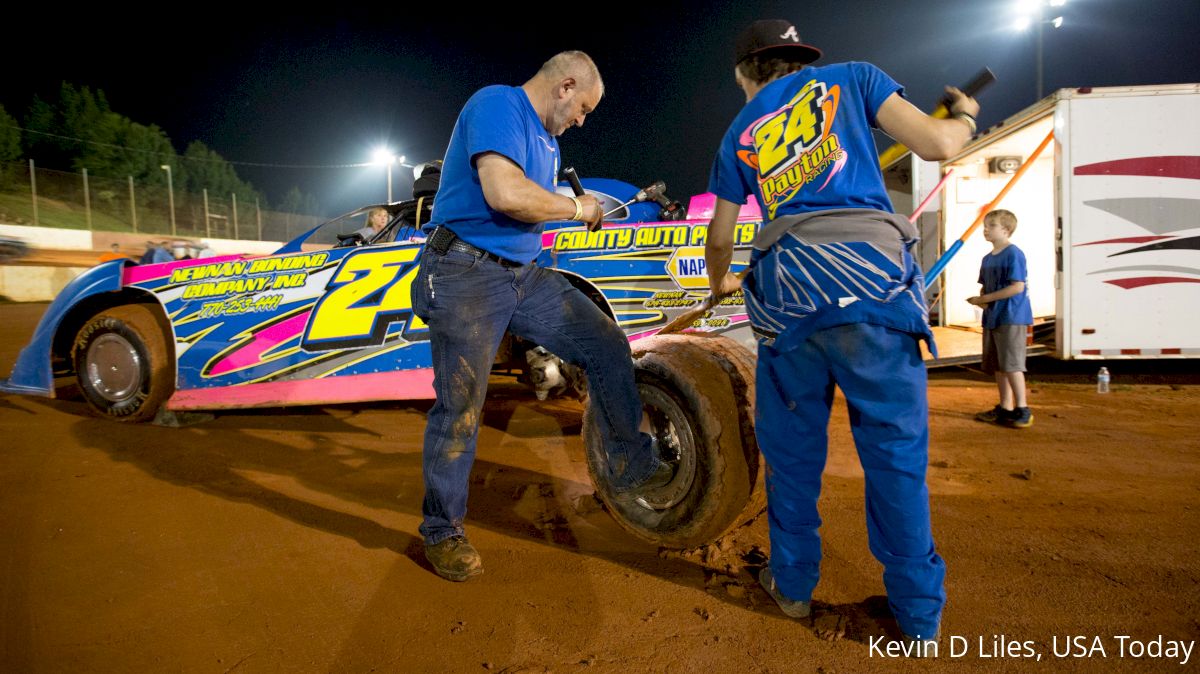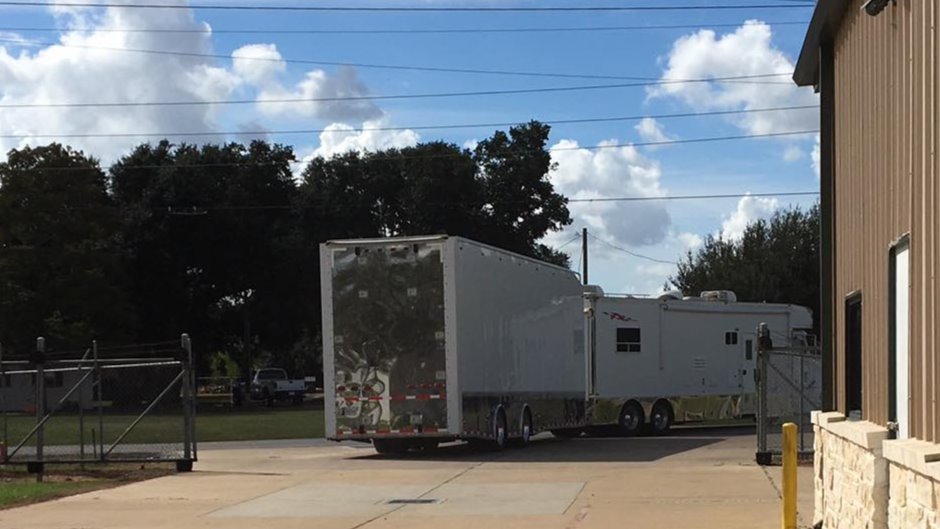Good Men Are Hard To Find For The National Tour, But Are So Necessary
Good Men Are Hard To Find For The National Tour, But Are So Necessary
Now that you have spent a half-million dollars on equipment, it's time to hire a few good men to make the national tour.

By Jonathon Masters
In the first part of our look into what it takes to run a dirt team nationally, we talked about the financial burden of putting a car on the track from an equipment standpoint. Now, it's time to turn the attention to manpower.
While the $500,000 we have already accounted for is certainly a hurdle for your national touring dreams, it is only a part of a racer's budget. The real success behind running up and down the road is finding good help, and that is rare and priceless. The unfortunate truth is that good help in racing is getting harder to find and the cost of this help could be the difference between running for a track championship or a national championship.
Let's first address what good help is going to cost IF you can find it. A lot of the full-time crew chiefs out there are making between $600 to $1,000 or more per week. We are going to estimate having one guy in the mid-range and one guy in the low range on our team. So you should budget at least $70,000 for annual crew salaries.
Most dirt track racers have to use toter trucks that combine as living quarters to pull their haulers, so you won't need to worry about hotel costs. But these crew members are going to get hungry while working on your car, so make sure to add food and assorted costs of $10,000 a season.
Congratulations, you now know the financial burden you are going to be taking on for your season of chasing the dream. Now for the task of finding that crew to take to the road with you. Good help is hard to find, and it isn't getting any easier as the years go on.

A story comes to mind of something I saw at the track one night in 2010. A national driver with a lot of big wins to his name was trying to teach a new crew member how to use a stopwatch before hot laps. He demonstrated how to use the stopwatch three times to the young man then looked up at him and asked, "Understand?" By the look on the young man's face you could tell that he was still clueless. Needless to say, the driver did not have the best night. He had been struggling to find knowledgeable help for a few months, and it was greatly affecting his performance.
The story demonstrates that good help can make or break a team. If the best drivers in the country are not able to find the checkers with bad help, then how can anyone? Adding to the problem is that the situation seems to be getting worse with time rather than better. There was a time in the last 20 years when there was a pool of around 20 to 30 great crew men for hire any given season. Now it's hard to find five to 10, and with more than 40 teams racing at national levels there is simply not enough to go around.
Why has there been such a talent drain in the past 15 years when it comes to dirt racing crews? There are two main factors that play into the problem: the lack of mechanical education in our modern world and a change in the country's culture over the past two decades.
Former national dirt late model traveling crew chief Kirk Loudy of Envy Suspension elaborates, "The schools today have moved away to teaching any auto-mechanic classes. Kids today have no way of learning the basics and no interest in doing things themselves."
Loudy cites the lack of education and teachers willing to work with kids on the types of mechanical skills that lead to good help in racing.
"There is not tinkering anymore," Loudy said. "You can see it in the way people buy race cars. There is a well-known car builder I talk with that will not even sell a frame anymore. He's afraid the purchasing group will not know how to assemble the car correctly and make his product look bad in return. The younger generation just isn't developing the skills for themselves."
By the time of my high school years, auto shop was a thing of the past. It seemed to start around my generation (I'm currently 30). So as this age group settled down into work positions that required less travel in the last 15 years, it created a gap that has not been filled fast enough.

The other factor is the change in the country's culture over the past two decades. Millennials are perpetually walking around with their eyes on cell phones. While they have showed that they are more than happy to attend races, they have not shown the same excitement when it comes to getting involved.
Racing to most of them is a Friday or Saturday night activity. The crew members of years past spent their spare time working on race cars and learning the trade. It was a way of life and a passion. Today's potential crew members have drowned out that passion with other forms of entertainment. Yes, the world has changed.
That defines the crux of the problem. You can either pay a premium for the help that is still out there or attempt to spend countless hours training somebody with desire but not the skills. It is hard to do on the job training while running up and down the road racing.
So ends our journey of seeing what it takes to run a national touring series. In the end, all it takes is around a half-million dollars, help that is nearly impossible to find, and hopefully enough talent and desire to outweigh the first two.
Other than that, it's just go fast and turn left. Sounds simple, right?
Next week, we will look at some of the skills needed to sit behind the wheel and make the magic happen.
- Jonathon Masters has a lifelong connection with dirt racing. His family has owned and operated MasterSbilt Race Cars manufacturing dirt late model chassis for 35 years. He attended college in North Carolina for motor sports management and has written for various industry publications. Jonathon was an account executive at The International Motorsports Industry Show, founder of the Heartland Auto Racing Show, and has been a racing industry professional for over a decade.

Steve Casebolt Moves to Jim Beeman Motorsports
Engagement Is One Key To Dirt Racing's Success And NASCAR's Decline
The Changing Of NASCAR's Guard
Kasey Kahne's Future May Have Already Started
Ford Drivers Found Guilty Heading To Kansas
The Dillon Brothers' Grassroots Are Deep
In the first part of our look into what it takes to run a dirt team nationally, we talked about the financial burden of putting a car on the track from an equipment standpoint. Now, it's time to turn the attention to manpower.
While the $500,000 we have already accounted for is certainly a hurdle for your national touring dreams, it is only a part of a racer's budget. The real success behind running up and down the road is finding good help, and that is rare and priceless. The unfortunate truth is that good help in racing is getting harder to find and the cost of this help could be the difference between running for a track championship or a national championship.
Let's first address what good help is going to cost IF you can find it. A lot of the full-time crew chiefs out there are making between $600 to $1,000 or more per week. We are going to estimate having one guy in the mid-range and one guy in the low range on our team. So you should budget at least $70,000 for annual crew salaries.
Most dirt track racers have to use toter trucks that combine as living quarters to pull their haulers, so you won't need to worry about hotel costs. But these crew members are going to get hungry while working on your car, so make sure to add food and assorted costs of $10,000 a season.
Congratulations, you now know the financial burden you are going to be taking on for your season of chasing the dream. Now for the task of finding that crew to take to the road with you. Good help is hard to find, and it isn't getting any easier as the years go on.

A story comes to mind of something I saw at the track one night in 2010. A national driver with a lot of big wins to his name was trying to teach a new crew member how to use a stopwatch before hot laps. He demonstrated how to use the stopwatch three times to the young man then looked up at him and asked, "Understand?" By the look on the young man's face you could tell that he was still clueless. Needless to say, the driver did not have the best night. He had been struggling to find knowledgeable help for a few months, and it was greatly affecting his performance.
The story demonstrates that good help can make or break a team. If the best drivers in the country are not able to find the checkers with bad help, then how can anyone? Adding to the problem is that the situation seems to be getting worse with time rather than better. There was a time in the last 20 years when there was a pool of around 20 to 30 great crew men for hire any given season. Now it's hard to find five to 10, and with more than 40 teams racing at national levels there is simply not enough to go around.
Why has there been such a talent drain in the past 15 years when it comes to dirt racing crews? There are two main factors that play into the problem: the lack of mechanical education in our modern world and a change in the country's culture over the past two decades.
Former national dirt late model traveling crew chief Kirk Loudy of Envy Suspension elaborates, "The schools today have moved away to teaching any auto-mechanic classes. Kids today have no way of learning the basics and no interest in doing things themselves."
Loudy cites the lack of education and teachers willing to work with kids on the types of mechanical skills that lead to good help in racing.
"There is not tinkering anymore," Loudy said. "You can see it in the way people buy race cars. There is a well-known car builder I talk with that will not even sell a frame anymore. He's afraid the purchasing group will not know how to assemble the car correctly and make his product look bad in return. The younger generation just isn't developing the skills for themselves."
By the time of my high school years, auto shop was a thing of the past. It seemed to start around my generation (I'm currently 30). So as this age group settled down into work positions that required less travel in the last 15 years, it created a gap that has not been filled fast enough.

The other factor is the change in the country's culture over the past two decades. Millennials are perpetually walking around with their eyes on cell phones. While they have showed that they are more than happy to attend races, they have not shown the same excitement when it comes to getting involved.
Racing to most of them is a Friday or Saturday night activity. The crew members of years past spent their spare time working on race cars and learning the trade. It was a way of life and a passion. Today's potential crew members have drowned out that passion with other forms of entertainment. Yes, the world has changed.
That defines the crux of the problem. You can either pay a premium for the help that is still out there or attempt to spend countless hours training somebody with desire but not the skills. It is hard to do on the job training while running up and down the road racing.
So ends our journey of seeing what it takes to run a national touring series. In the end, all it takes is around a half-million dollars, help that is nearly impossible to find, and hopefully enough talent and desire to outweigh the first two.
Other than that, it's just go fast and turn left. Sounds simple, right?
Next week, we will look at some of the skills needed to sit behind the wheel and make the magic happen.
- Jonathon Masters has a lifelong connection with dirt racing. His family has owned and operated MasterSbilt Race Cars manufacturing dirt late model chassis for 35 years. He attended college in North Carolina for motor sports management and has written for various industry publications. Jonathon was an account executive at The International Motorsports Industry Show, founder of the Heartland Auto Racing Show, and has been a racing industry professional for over a decade.

Exclusive Content
Weekly Columns by Jonathon Masters
All It Takes To Run A National Tour Is Guts, Talent, And A Half-MillionSteve Casebolt Moves to Jim Beeman Motorsports
Engagement Is One Key To Dirt Racing's Success And NASCAR's Decline
Weekly Columns by JD Hellman
Change What Matters Most In The All-star raceThe Changing Of NASCAR's Guard
Kasey Kahne's Future May Have Already Started
Ford Drivers Found Guilty Heading To Kansas
The Dillon Brothers' Grassroots Are Deep